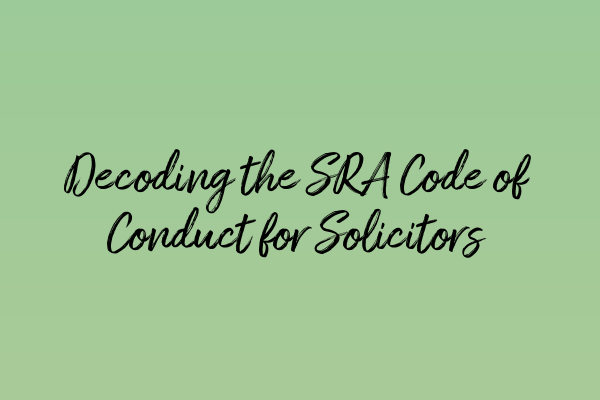Decoding the SRA Code of Conduct for Solicitors
As a solicitor, it is of utmost importance to familiarize yourself with the Solicitors Regulation Authority (SRA) Code of Conduct. This code sets out the standards and principles that solicitors must comply with in their professional practice. Understanding and adhering to the SRA Code of Conduct not only ensures ethical behavior but also helps maintain the reputation of the legal profession.
In this blog post, we will decode the SRA Code of Conduct, explaining its key principles and providing insights into its applicability to your legal practice.
1. Integrity
Integrity is a foundational principle of the SRA Code of Conduct. It requires solicitors to act honestly and with high moral and ethical standards. It is essential for solicitors to maintain their integrity in all their professional dealings.
Introducing a colleague to the concept of integrity, the SRA emphasizes that solicitors must always act in the best interests of their clients and avoid any conflict of interest that could compromise their professional judgment.
Furthermore, the concept of integrity also extends to maintaining trust and confidence in the legal profession. Solicitors must promote and protect the rule of law and the administration of justice.
2. Competence
Competence is another crucial aspect of the SRA Code of Conduct. Solicitors are expected to provide services to their clients with a high level of skill, knowledge, and diligence.
The SRA highlights the need for solicitors to continuously develop and maintain their knowledge and skills. This could involve participating in relevant training programs, staying up-to-date with legal developments, and seeking professional guidance when necessary.
By showcasing your competence, you not only provide an excellent service to your clients but also enhance your professional reputation.
3. Confidentiality
The SRA Code of Conduct places great importance on solicitors maintaining the confidentiality of their clients’ information. Clients must have trust in the fact that their communications with their solicitors will be kept private.
It is crucial for solicitors to understand the boundaries of confidentiality and ensure that they do not disclose any confidential information without proper authorization. Breaching client confidentiality not only harms the client but also reflects poorly on the solicitor and the legal profession as a whole.
4. Independence
Solicitors are expected to act independently and without any external influence that may compromise their professional judgment. The SRA Code of Conduct emphasizes the importance of avoiding conflicts of interest and maintaining a position of independence.
As a solicitor, it is essential to act in the best interests of your clients and provide unbiased advice and representation. Any potential conflicts of interest must be identified and addressed promptly to ensure the integrity of your legal practice.
5. Public Trust
The SRA Code of Conduct places a significant emphasis on maintaining public trust in the legal profession. Solicitors are expected to uphold the principles of fairness and justice and act in a manner that promotes public confidence.
By adhering to the SRA Code of Conduct, solicitors can demonstrate their dedication to professional ethics and foster the belief that the legal profession is committed to serving the best interests of the public.
Conclusion
The SRA Code of Conduct for solicitors outlines the fundamental principles that govern the legal profession. By understanding and applying these principles, solicitors can ensure ethical behavior, maintain their professional reputation, and uphold the trust placed in them by their clients and the public.
If you are preparing for the Solicitors Qualifying Examination (SQE), make sure to check out these related articles:


Leave a Reply